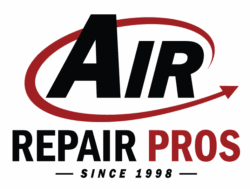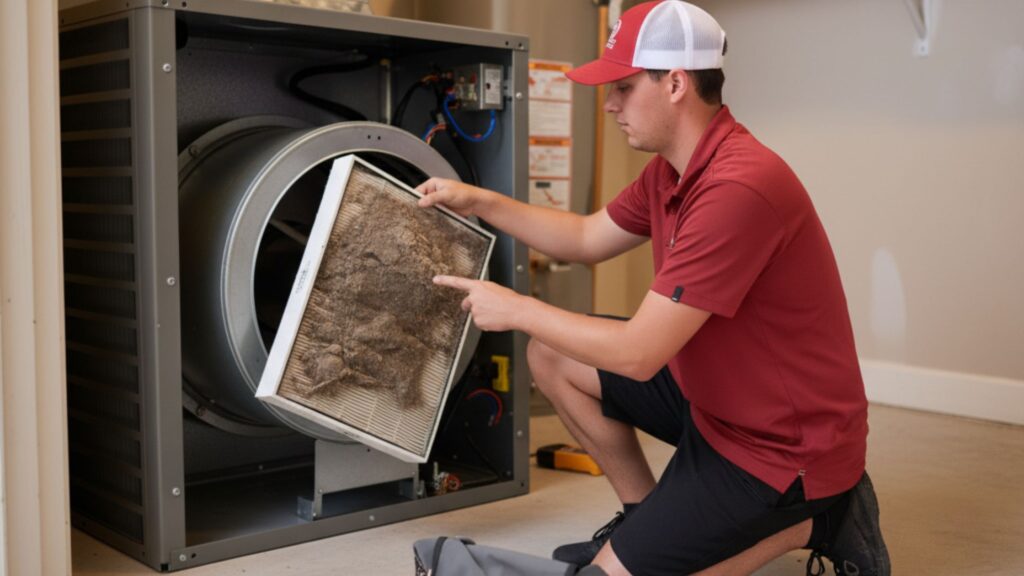Has it ever occurred to you that you can clean your indoor air using your air conditioner? Yes, your running AC improves indoor air quality by filtering out pollutants, reducing allergens, and controlling humidity. And the best part? You can do it without even major renovations.
While most homeowners in Frisco, North Dallas, associate air conditioners with cooling, they also maintain a healthy and comfortable indoor environment. You simply need to follow a few steps to do it at home. The right steps can make your home healthier, cleaner, and more comfortable.
How Can You Make Your AC Improve Indoor Air Quality?
Along with fighting the scorching heat, having clean air is also a challenge in Frisco, North Dallas. But you don’t need to worry about it because we are going to tell you 6 simple tips that improve your indoor quality without changing your existing unit.
1. Regular Maintenance Matters
The first step toward clean indoor air is keeping your HVAC system in good condition. Dust, dirt, and allergens often build up inside filters, coils, and ductwork. When this happens, your system struggles to perform, and air quality suffers.
Scheduling routine maintenance is the best way to protect against this. Changing air filters, cleaning out ducts, and inspecting the components keep the system efficient and reduce harmful buildup. Many homeowners benefit from a duct cleaning service every few years to remove debris and hidden contaminants that circulate through the vents.
Experts recommend having a professional HVAC inspection at least once a year. A technician can test the equipment, identify safety concerns, and tune up any parts that need attention. This proactive approach ensures your AC not only cools your home but also helps you breathe cleaner air.
2. Invest in High-Quality Air Filters
Your air filter is the first line of defense against poor indoor air. Standard filters may trap large dust particles, but they’re not designed for maximum health protection. Upgrading to high-efficiency filters can make a big difference.
Look for filters labeled as HEPA (high-efficiency particulate air). According to the EPA, these filters can remove 99.97% of airborne particles such as mold, pollen, and bacteria. For most homes, a filter with a MERV rating between 8 and 10 is a smart choice. This means it can capture both larger and smaller pollutants.
If you’re unsure which filter works best for your system, consult an HVAC professional. Also, check the replacement schedule as most filters should be changed every one to three months. By staying consistent, your air filtration system works at peak performance and your home feels noticeably fresher.
3. Use Ventilation to Your Advantage
Even with strong filters, indoor air can become stale if it isn’t refreshed. Proper ventilation is key to balancing your home’s airflow. By exchanging indoor air with refreshing outdoor air, you dilute pollutants and reduce odors.
Exhaust fans are a simple but powerful tool. Run them in bathrooms to reduce moisture and in kitchens to clear smoke or cooking fumes. Ventilation also lowers the risk of mold growth, which can be harmful to your respiratory system.
If your home feels stuffy, talk to AC repair services in North Dallas, TX, about advanced ventilation solutions that work with your AC system. This way, your indoor environment always feels fresh and balanced.
4. Consider Adding an Air Purifier
While your AC does a lot of the heavy lifting, pairing it with an air purifier can take your air quality to another level. A whole-home air purifier integrates with your HVAC system and captures particles that regular filters might miss.
These systems are especially helpful if anyone in your home suffers from allergies or asthma. Air purifiers can target finer pollutants such as pet dander, smoke, and volatile organic compounds (VOCs).
For smaller spaces or specific rooms, portable purifiers are another option. Place them in bedrooms or living areas where you spend the most time for the best results.
5. Manage Humidity Levels
Air quality is not only about removing particles, it’s also about controlling moisture. Too much humidity encourages mold and dust mites, while very dry air can irritate your throat and skin.
Your AC system can help regulate humidity when adjusted correctly. Ideally, your home’s humidity should stay between 30% and 50%. If your air feels damp or sticky, a dehumidifier may be necessary. In contrast, if the air is too dry, consider a humidifier during colder months.
Maintaining proper humidity creates an indoor environment where contaminants cannot thrive, and it helps your AC system run more efficiently. Good indoor air will also help you detect any signs of AC compressor failure in your system.
6. Seal Ductwork and Leaks
Leaky ducts are a hidden problem that many homeowners overlook. When ducts have gaps or cracks, they pull in dust, dirt, and even pests from unconditioned areas like attics or crawl spaces. This polluted air then circulates throughout your home.
Inspecting and sealing your ductwork ensures your air stays clean and your system runs efficiently. Professional air conditioning services in North Dallas, TX can find and repair leaks, improving airflow and preventing contaminants from entering. If you suspect issues, don’t delay, as clean ducts are essential for healthy indoor air.
Final Thoughts
Your air conditioner is more than just a cooling appliance. With some smart tips, your AC improves indoor air quality and promises a healthy environment for your family. The best part is, you don’t need to replace the unit just to clean the indoor air.
Still have questions? Call Air Repair Pros, and we will answer all your queries. Not only this, we can help you make your unit more efficient so your indoor air quality remains clean and you can enjoy the Texans’ scorching heat comfortably.
Call our HVAC Service North Dallas at 469-517-8565 or book online to make your unit productive and indoor air more hygienic.
(FAQs) Frequently Asked Questions
How often should I change my AC filter to keep the air clean?
Most filters should be replaced every 1–3 months. If you have pets, allergies, or live in a dusty area, monthly changes work best. A clean AC filter keeps your system efficient and helps trap dust, pollen, and other particles.
Can duct cleaning really improve indoor air quality?
Yes, duct cleaning helps remove dust, dirt, and allergens that collect inside your ducts. If your vents smell musty or release visible dust, a professional duct cleaning service can make the air fresher and help your AC system run better.
Do I need a whole-home air purifier if I already have AC filters?
Air filters capture many particles, but a whole-home air purifier can trap smaller pollutants like smoke or bacteria. If you or your family members have allergies or asthma, adding a purifier alongside your AC filters can make a noticeable difference.
What humidity level is best for healthy indoor air?
The best home’s humidity is between 30% and 50%. Higher humidity encourages mold and dust mites, while very dry air can irritate your skin and throat. Using your AC settings or adding a humidifier or dehumidifier helps keep this balance.
How can I tell if my ductwork has leaks?
Signs of leaky ducts include uneven cooling, higher energy bills, and dusty rooms. Sometimes you may feel air escaping from joints or notice weak airflow from vents. If you suspect leaks, an HVAC professional can inspect and seal your ducts properly.

